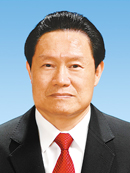 Name
Name
Zhou Yongkang 周永康
Current status
Awaiting Trial
Born
1942
Relevance to Tibet
Former Head of Politics & Law Commission – a Party body that oversees all legal enforcement authorities and Member of 17th Politburo Standing Committee.
 Name
Name
Zhou Yongkang 周永康
Current status
Awaiting Trial
Born
1942
Relevance to Tibet
Former Head of Politics & Law Commission – a Party body that oversees all legal enforcement authorities and Member of 17th Politburo Standing Committee.
Pronunciation: Joe Yoong-kahng soundbite
Born: 1942. A “princeling” (? Possibly married to a niece of Jiang Zemin).
Education: Qinghua University, hydraulic engineering.
Career: Number 9 in the Politburo Standing Committee; Secretary of the Politics & Law Commission 2007 – 2012; Head of the Leading Group for Maintaining Social Stability. Minister for Public Security until 2007 when, also as a Politburo member, was “the most powerful public security minister in recent history” according to Dui Hua.
Prospects: In Prison awaiting trial for corruption. Stripped of his Party membership.
Relevance to Tibet: Was responsible for maintaining social stability. Former Sichuan Party Secretary. Former member of the Tibet Work Leading Group.
Retired Politburo Standing Committee member Zhou Yongkang was formally arrested in December 2014 and stripped of his membership of the Chinese Communist Party. On 3 April 2015, Chinese state media announced that Zhou had been formally charged with bribery, corruption and intentionally disclosing state secrets. Zhou is the most senior member of what Communist Party cadres are terming the “New Gang of Four”, other members of which are former Chongqing Party Secretary Bo Xilai, former United Front Work Department Head Ling Jihua and Xu Caihou, a former Vice Chairman of the Central Military Commission.
Zhou was formerly Head of the Politics and Law Commission, the highest legislative oversight body in China, overseeing all legal enforcement authorities, including the police force (according to Wikipedia). Whilst Zhou held a Politburo Standing Committee seat, in 2012 the Standing Committee was reduced from nine members to seven, which resulted in the role of domestic security chief (now held by Meng Jianzhu) being downgraded, possibly reflecting fears that the position had become too powerful.
Widely thought of as a hardliner; sources say Zhou’s speeches were laced with concern that political dissidents “might try to manipulate local protests to put pressure on the party itself.” Zhou however acknowledged huge rise in ‘mass incidents’ and talked of dealing with them more humanely and eliminating situations that give rise to protest.
Zhou was Head of Leading Group on Maintaining Social Stability. China’s 2010 budget for maintaining social stability was 514 billion yuan… almost equal to China’s 518.6 billion yuan defence budget and an 8.9% increase from 2009. (Asia Times).
Other Career Highlights:
Minister of Public Security 2003-2007 (and thereby a member of the Tibet Work Leading Group).
Party Secretary of Sichuan Province 1999-2002; when Tenzin Delek Rinpoche was detained.
Early career (20 years) in the oil industry, where he retained influence. In January 2015, Xinhua recognised the existence of a number of “cliques” or factions, including the ‘Petroleum Gang’, which Zhou was widely considered the leader of. Other members arrested are Jiang Jiemin, former chairman of China National Petroleum Corporation (CNPC), who was also the first Central Committee member that was probed after Xi Jinping took over power in November 2012, and officials from PetroChina.
In his former career, Zhou Yongkang also worked with Zhang Qingli who later became TAR Party Secretary and is currently a Vice Chairman of the Chinese People’s Political Consultative Conference.
An ally of Jiang Zemin.